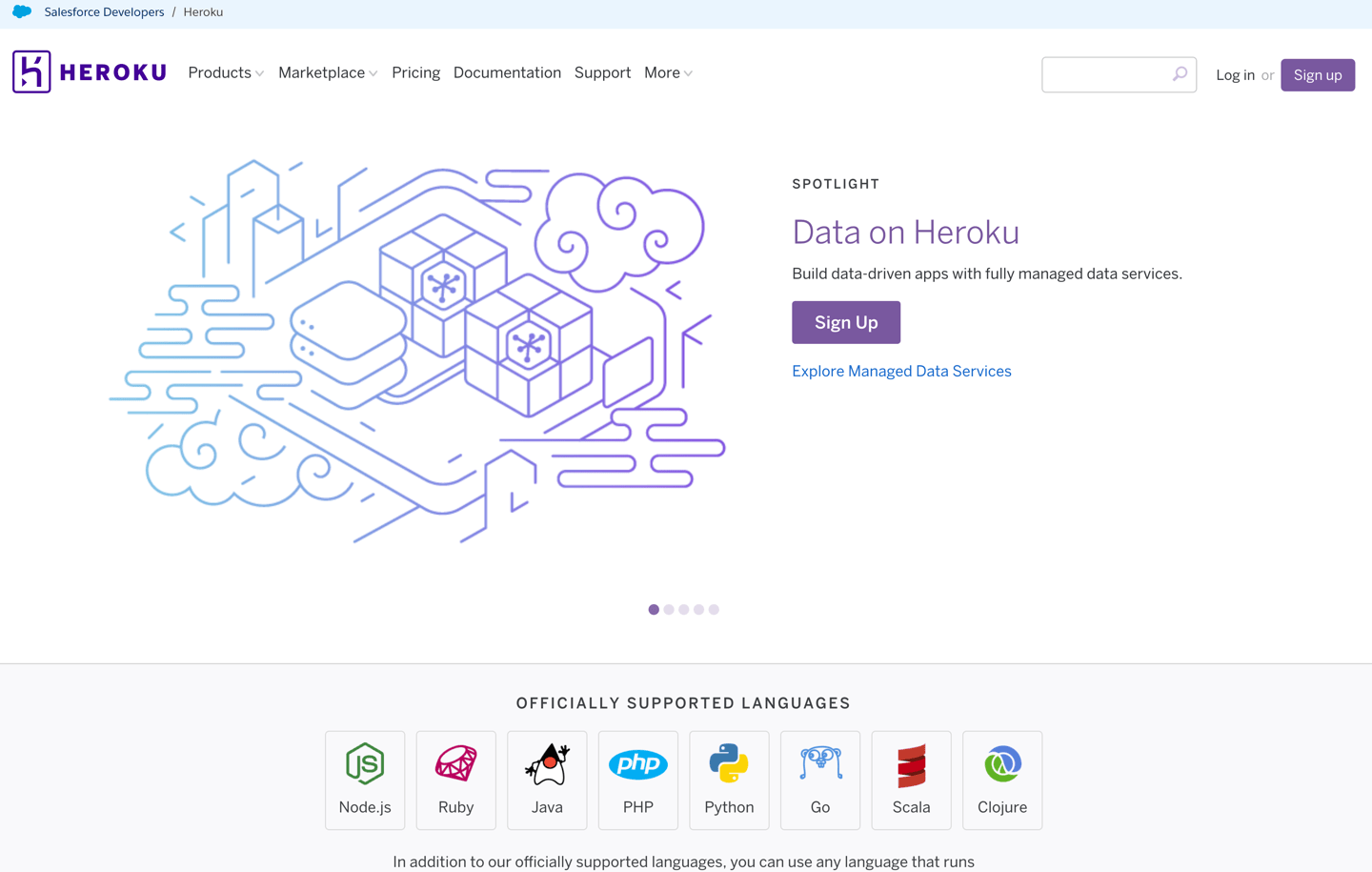
Heroku 🇺🇸
Easily deploy and scale web apps
Since its founding in 2007, Heroku has been a popular PaaS to deploy web apps in the cloud.
You can extend its functionality via marketplace add-ons. For example, you can use add-ons to create managed databases, set up monitoring, analytics, logging and also send transactional emails.
Example customers include Airbase, Dovetail, Hotel Engine, ClickMechanic, Ambassify. More here.

Heroku Homepage
What's good about Heroku
- Fully-managed infra, minimal ops overhead
- Heroku Postgres is a one-click, battle-tested database
- Extensive add-on marketplace
Heroku pricing examples
Below are some example configurations and their estimated costs:
| Example configuration | Estimated cost |
|---|---|
| VM Small | $50.00 / mo Dyno 1 GB RAM (Standard 2X) |
| VM Medium | $250.00 / mo Dyno 2.5 GB RAM (Performance M) |
| VM Large | $500.00 / mo Dyno 14 GB RAM (Performance L) |
| Load Balancer | Included in plan |
| Managed PostgreSQL | $50.00 / mo 4 GB RAM, 64 GB storage |
| Managed Redis®* | $200.00 / mo 1 GB RAM |
| Free egress allowance | 2 TB / mo per app |
| 1 TB of egress beyond allowance | Not publicly listed Bandwidth is soft limited per app (2 TB / mo) |
Note: Our pricing examples are based on several assumptions. Your actual costs may differ. Always check the cloud provider's website for the most up-to-date pricing. You can find Heroku's latest pricing here.
Which services does Heroku offer
Data center locations
Based on our records, Heroku has 10 data center locations:
| Slug | Country | Location |
|---|---|---|
| sydney | Australia 🇦🇺 | Sydney |
| montreal | Canada 🇨🇦 | Montreal |
| frankfurt | Germany 🇩🇪 | Frankfurt |
| mumbai | India 🇮🇳 | Mumbai |
| dublin | Ireland 🇮🇪 | Dublin |
| tokyo | Japan 🇯🇵 | Tokyo |
| singapore | Singapore 🇸🇬 | Singapore |
| london | UK 🇬🇧 | London |
| virginia | USA 🇺🇸 | Virginia |
| oregon | USA 🇺🇸 | Oregon |
Alternatives to Heroku

Railway🇺🇸
We like Railway for its great developer experience, usage-based pricing, and for its wide range of deployment templates.

Scaleway🇫🇷
If you're looking for a European-based provider that might be a good alternative to Heroku, Scaleway offers a wide range of managed services and server configurations.

Fly.io🇺🇸
Fly.io is a solid alternative to Heroku if you're looking to deploy your app across multiple regions and would like to keep your operational overhead and costs under control.

DigitalOcean🇺🇸
DigitalOcean's App Platform is worth looking into if you want a similar deployment experience as Heroku's, but at a lower price point.

Sevalla🇺🇸
Sevalla is a solid alternative to Heroku if you're looking for a push to deploy experience and a fully managed platform.

Render🇺🇸
Render is a great alternative to Heroku if you're looking for a fully managed experience at more affordable prices.

Flightcontrol🇺🇸
If you're looking to migrate from Heroku to AWS, consider using Flightcontrol. They give you a Heroku-like experience on top of your AWS account and at a fraction of the cost.
Our data for Heroku was last updated on Nov. 12, 2024.
